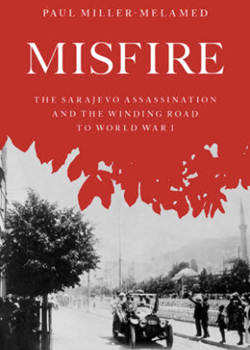'Misfire: The Sarajevo Assassination and the Winding Road to World War 1' by Paul Miller-Melamed
- Home
- World War I Book Reviews
- 'Misfire: The Sarajevo Assassination and the Winding Road to World War 1' by Paul Miller-Melamed

Oxford University Press, 2022
£22.99 Hardback
194 pages, 32 images, 4 maps.
ISBN 9780195331042.
It is sometimes said that ‘there is a reason for everything’ and for a world changing event as impactful and far–reaching as the First World War then the quest for a root cause takes on a particular urgency. Whilst the expansive histography on this topic has coalesced around political and diplomatic failures in the context of inter–state rivalries and alliances, the assassination of the Archduke Franz Ferdinand by Gavrilo Princip is invariably cited as ‘the spark that lit the fire’. In this authoritative and meticulously researched book, renowned Balkan expert Paul Miller–Melamed argues that the death of the Archduke has been overly romanticised and that the mythology surrounding the plot has served to detract from a more considered understanding of why tensions in the Balkans escalated into a conflict which claimed approximately forty million lives.
Much of the book is concerned with the emerging tensions between an increasingly irrelevant Hapsburg empire and Serbia’s self–interested overreach. The author explores the historical background leaving the reader with the impression that myriad flashpoints during the latter part of the nineteenth century and the early part of the twentieth had the potential to ignite a large–scale conflict. For those who are not familiar with the twists and turns of Balkan politics the first few chapters are heavy going. However, ample reward comes in the fifth chapter (pithily entitled ‘World History is Horrific from Up Close’) where, with the context in mind, the assassination plot is described in a richness of detail. Assumptions, often made, about the duplicity of the Serbian government and the influence of German millenarianism are successfully challenged.
This narration of the story of the Sarajevo assassination and the origins of the First World War from a Balkan perspective brings a fresh perspective on to a topic which continues to excite much debate. Clearly, the annexation of the Balkan provinces of Bosnia and Herzegovina by Austria–Hungary in 1908 and the resultant resentment felt by Serbia and Russia, did stoke international rivalries. However, the sporadic outbreaks of violent dissent which occurred during the ensuing years (including the Archduke’s assassination) were not, in themselves, the cause of the First World War. As the author says in his introduction the real causes lie in ‘civilised’ Europe rather than the endlessly political murder. Maybe Thomas Hobbes was right in prompting the idea that civilisation is a thin veneer hiding an otherwise brutish and selfish nature. This base instinct is writ large in the horrors of the First World War and the failures in 1914 must surely be attributed to the European diplomatic and political class – and not to the actions of a desperate and frustrated youth on a street corner in Sarajevo.
Review by Phil Curme
[This review appeared in the January 2023 edition of Stand To! the journal of The Western Front Association. This is published four times a year and available to WFA members in print or digital form].
Paul Miller-Melamed is the author of Misfire: The Sarajevo Assassination and the Winding Road to World War I. He teaches history at the John Paul II Catholic University of Lublin in Poland and McDaniel College in the United States. He is also the author of From Revolutionaries to Citizens: Antimilitarism in France, 1870-1914 and the co-editor of Embers of Empire: Continuity and Rupture in the Habsburg Successor States after 1914.





